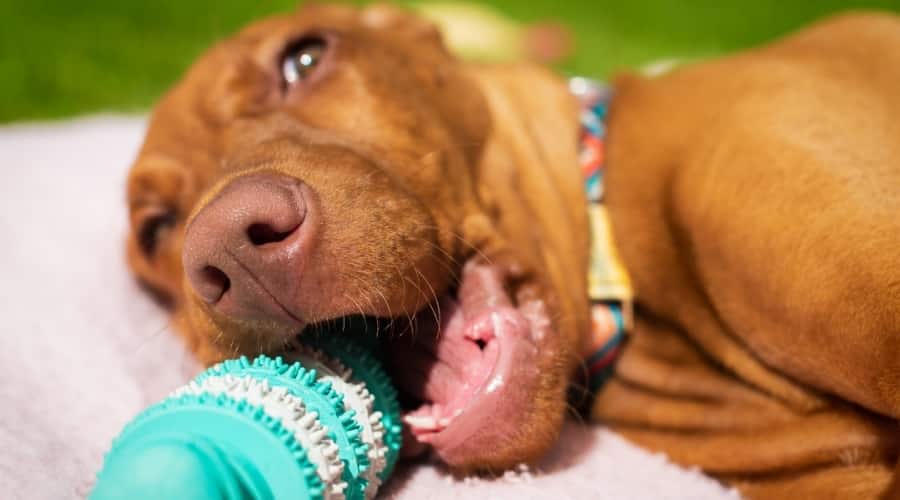New Puppy? Don’t Miss These Must-Know Vet Milestones!
When you purchase through links on our site, we may earn a commission. Here’s how it works.
You brought home a tail-wagging, sock-stealing, belly-rub-demanding ball of fluff, and suddenly, you’re responsible for their entire life. Those tiny paws, curious sniffs, and sleepy snuggles quickly steal your heart. And in that whirlwind of chew toys and potty training, it’s easy to overlook one critical question: How often do you need to schedule puppy check-ups?
Table of Contents
From essential vaccines to tracking growth spurts and spotting early health concerns, your little sidekick needs a solid care routine from day one. One of the very first steps? Scheduling that all-important first vet visit to make sure your puppy’s on the right track.
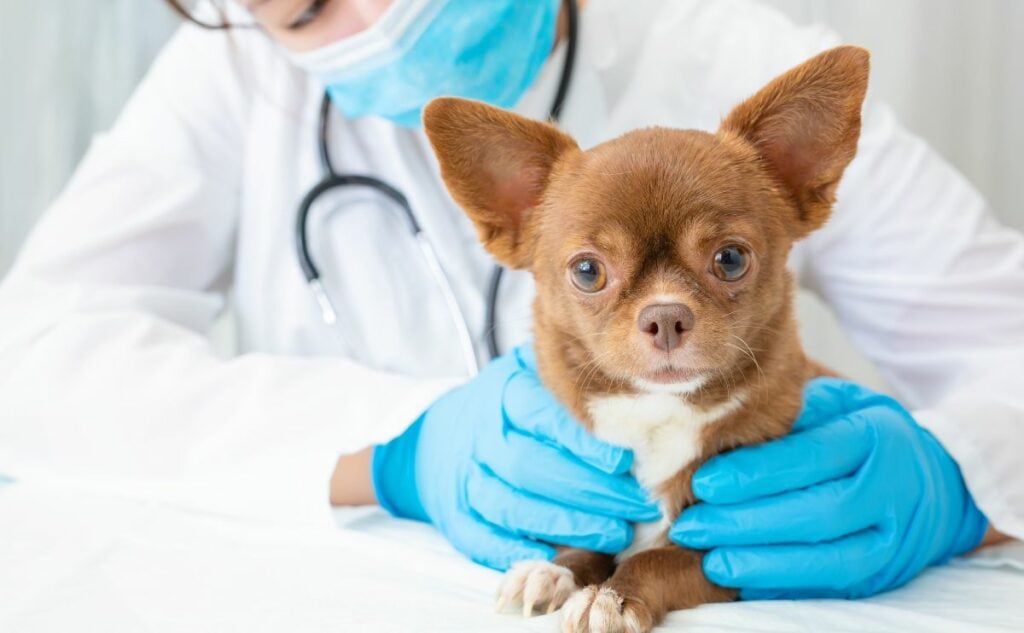
Your Puppy Deserves the Best: How to Find a Vet You Can Trust
A good veterinarian is more than just a medical provider. They become your trusted partner through all stages of your dog’s life, from puppyhood through adulthood and beyond. That first puppy check-up is just the beginning of a long relationship, so it’s worth putting in the effort to find the right fit.
Don’t just pick the first vet that a Google search throws up. Always do your research when choosing a vet. That’s important, as your vet will be the first emergency responder throughout your dog’s life. The American Veterinary Medical Association (AVMA) calls this the “VCPR” or Veterinary Client Patient Relationship.
Here’s how to make a thoughtful and informed choice:
Ask Around
One of the best ways to find a great vet is by talking to other local dog owners. Ask friends, neighbors, trainers, or staff at pet stores which clinics they recommend and why. You might learn which vets are especially gentle, those who take time to explain things clearly, or which clinics are known for exceptional care. If your breeder or rescue group is local, they may also have long-standing relationships with clinics they trust.
You wouldn’t trust just anyone with your health, and your puppy deserves that same careful consideration.
Key factors to consider:
- Accreditation: Is the clinic AAHA-certified? That stamp of approval ensures they meet strict standards of care.
- Services Offered: Do they have dental care, diagnostics, and emergency support?
- Vibes Matter: You want a vet who kneels down to greet your pup, not one who sees them as a chart number.
- Proximity: Emergencies don’t wait. Choose a vet close enough that you can get there in minutes.
Look for Puppy-Friendly Services
Some veterinary clinics go beyond the basics by offering puppy welcome packs or introductory discounts for new pet parents. These often include helpful materials, samples of food or treats, and a clear outline of the care schedule for your puppy’s first year. Many clinics also offer puppy socialization classes, which help young dogs build confidence and learn how to behave around new people, animals, and environments. These experiences can reduce fear and anxiety during future vet visits.

Visit the Clinic in Person
Before scheduling your puppy’s first appointment, visit the clinic to get a feel for the environment. Ask yourself a few key questions:
- Is the reception area clean and organized?
- Are the staff friendly, helpful, and patient with questions?
- Does the veterinarian seem open, communicative, and genuinely interested in both pets and their people?
Pay attention to how animals are treated in the waiting room or during check-ins. These early observations can help you determine whether the clinic is a good fit for your pet’s long-term care.
Ask About Emergency Care
Puppies can be unpredictable, and medical issues don’t always happen during standard business hours. Make sure you understand how the clinic handles after-hours emergencies. Some clinics have their own emergency services, while others refer patients to nearby 24-hour facilities. Write down or save this information so you have it ready if a late-night problem ever arises.
Consider a Preventive Care Plan
Many veterinary clinics offer monthly wellness plans that cover routine treatments like vaccinations, deworming, flea and tick prevention, and annual health checks. These plans allow you to spread out costs over time, which can be especially helpful during your puppy’s first year when expenses tend to be higher. Some plans also include discounts on additional services such as dental cleanings or spay and neuter procedures.
Watch for Red Flags
While most clinics are professional and caring, it helps to know what to avoid. Be cautious if:
- Staff seem rushed, dismissive, or unwilling to answer questions.
- The facility appears disorganized or dirty.
- The vet discourages asking about treatment options or costs.
- You feel pressured into unnecessary services.
Your instincts matter. If something feels off, keep looking until you find a clinic where you and your puppy both feel comfortable.
Preparing for the First Visit
Before your first puppy check-up, bring any medical records or paperwork from the breeder or rescue. Have a list of questions ready, and note anything unusual you’ve observed, such as sneezing, itching, or a picky appetite. Bring a leash and a secure carrier or crate for transport, and consider offering treats or toys to help your puppy stay calm during the visit.
A positive first experience at the vet helps set the tone for a lifetime of good health and trust. Taking the time to choose the right clinic now will pay off in peace of mind and a happier, healthier dog.
When Should Your Puppy First See the Vet? Sooner Than You Think
It’s an unforgettable time when you first bring a puppy home. The first tail wag, sleepy snuggles, and tiny paws exploring every corner of your house create memories you’ll cherish forever. Amid all that joy and bonding, it’s important to remember one essential task: scheduling your puppy’s first veterinary appointment.
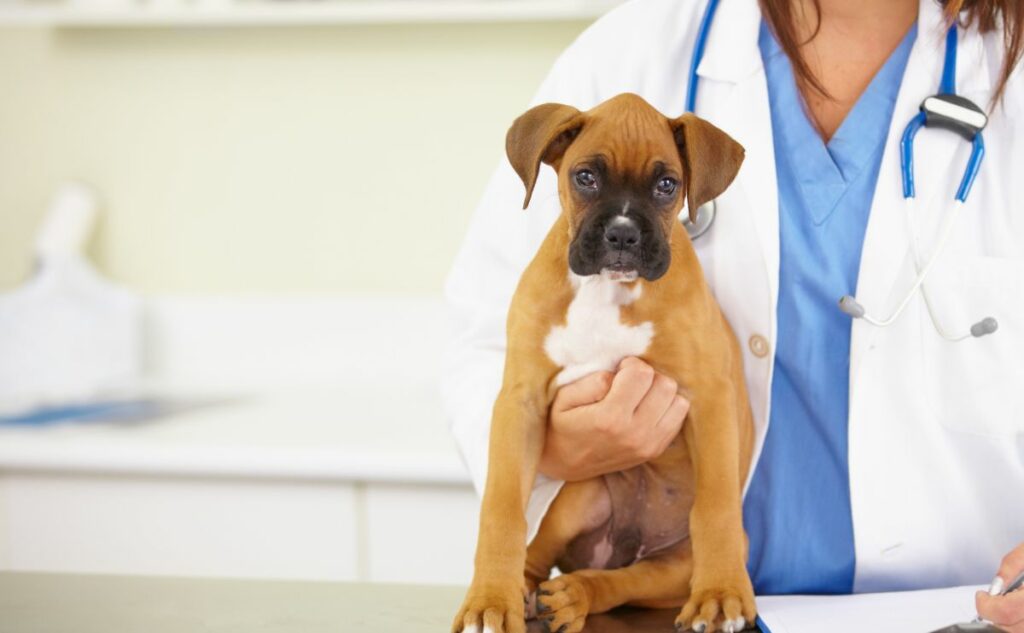
For Breeder Puppies: A Vet Visit Within Days
If you’re welcoming a pedigree puppy from a breeder, the first vet check is often more than just a good idea. It’s often a requirement. Most breeders include it in the purchase agreement, asking that a veterinarian examine your puppy within the first 72 hours of coming home.
This early puppy check-up serves several purposes: it confirms your puppy’s health, provides a record of their condition at the time of sale, and protects both you and the breeder if any concerns arise. The contract likely also includes a commitment to ongoing care, such as yearly exams and up-to-date vaccinations, which are crucial for lifelong health.
For Rescue Puppies: Immediate Care Is Key
Puppies adopted from shelters or rescue groups need prompt medical attention, too, sometimes even more urgently. These pups often come from uncertain backgrounds, and some may have been exposed to illness, stress, or poor conditions in places like puppy mills.
Even if the rescue has already provided basic care, following up with your veterinarian is essential. A complete physical exam with your vet ensures your puppy is truly on the right track and gives you the chance to ask questions and plan ahead. Most importantly, it gives you peace of mind.
Don’t Wait to Make the Appointment
Vet clinics tend to fill up quickly, especially during peak adoption seasons like spring and summer. If you wait until your puppy is already home, you may find yourself scrambling for an appointment.
The best approach is to book that first visit before the pickup day. That way, you can meet any contract deadlines, avoid last-minute stress, and ensure your puppy gets care right at the beginning when it matters most.
A Gentle Start Builds Confidence for Life
That first visit is more than just a health screening. It’s the beginning of your puppy’s relationship with their vet, a relationship that will support them through every stage of life. A calm, positive experience early on helps your puppy feel safe at the clinic, which makes future visits easier and less stressful.
You’re laying the foundation for a lifetime of good health. And that all starts with one thoughtful, timely appointment.
An early check-up also sets the stage for a positive relationship between your puppy and their vet. The sooner your dog begins to feel safe and comfortable in the clinic environment, the easier future visits will be for both of you.
First Vet Visit? Here’s Exactly What Happens
When you make an appointment for your puppy’s first health check, you should be asked to bring a sample of your pup’s feces so that the vet can test the sample for the presence of worms. Remember to call into the vet clinic to collect a sample jar a day or so before your appointment.
Here’s what should happen at your puppy’s first vet check-up:
- Your puppy should be weighed.
- The vet should listen to your puppy’s lungs and heart with a stethoscope.
- Next, the vet will gently palpate your puppy’s lymph nodes and abdomen.
- Your puppy’s temperature will be taken.
- The vet will examine your puppy’s eyes, nose, ears, paws, and genitalia.
- Your puppy’s coat and skin will be examined.
- The vet will check your puppy’s mouth and teeth.
Following the examination, the vet should ask general questions about your puppy’s history and answer any questions you have. The vet will also run through crucial issues such as de-worming, microchipping, de-sexing, and vaccinations.

Thinking About Pet Insurance? What New Puppy Owners Need to Know
Your vet may also discuss pet insurance with you. The average cost of pet insurance for a dog is around $55. It could mean the difference between life-saving treatment and euthanasia should your pet develop a serious condition that costs an unaffordable thousands of dollars to treat. And while your vet may promote one company, remember there are dozens of providers. So be sure to do your research to find the best dog insurance for your family.
The cost of a veterinary consultation can vary quite widely, depending on where you live. Puppy examinations generally start around $100.
New Puppy? Watch This First Vet Visit and Get Ready for Yours
The video below shares an example of a puppy’s first visit to the veterinarian:
Why Puppy Vaccinations Are Essential
Vaccinations are a cornerstone of your puppy’s early health care. They help build critical immunity against dangerous, highly contagious diseases like parvovirus, distemper, and rabies—illnesses that can be life-threatening, especially for young puppies with developing immune systems.
A veterinarian will create a vaccination schedule tailored to your puppy’s age, breed, and health status. Timing is everything; vaccines must be given at the correct intervals to be fully effective. These early appointments also allow your vet to assess your puppy’s overall health and identify any early concerns that may not be visible at home.
Each vaccine visit builds protection and trust between your puppy and their vet, as well as you and your veterinary team. Staying on schedule means your puppy can begin socializing, exploring, and growing with a strong protection foundation.
Ask Your Vet:
- Which vaccines does my puppy need, and when should they be given?
- Are there any optional vaccines you recommend based on our lifestyle or area?
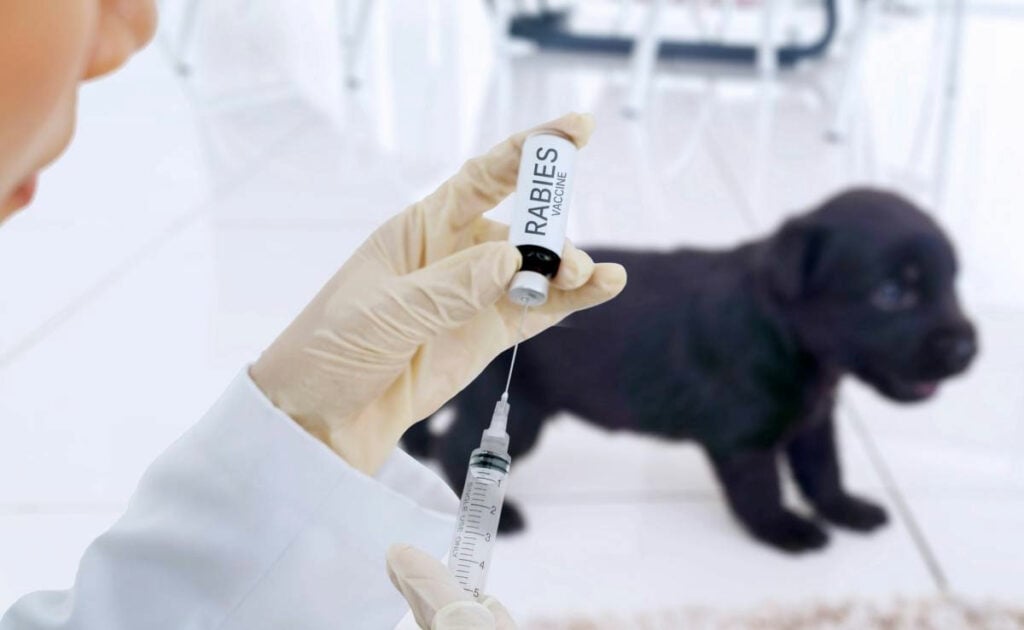
The Importance of Parasite Prevention
Fleas, ticks, heartworms, and intestinal parasites are more than just nuisances: they can seriously compromise a puppy’s health. From digestive issues to skin irritation to long-term organ damage, parasites are a common but preventable threat.
This is where your veterinarian becomes a key partner. Puppies vary in size, breed, and risk level, and no single parasite prevention plan fits every dog. Your vet will recommend safe, effective products based on your puppy’s needs and your local environment. Some medications provide broad coverage and are administered monthly; others are tailored to specific seasons or lifestyle factors.
Skipping or delaying parasite protection can lead to costly treatments later. Working closely with your vet ensures you’re staying ahead of problems and not reacting to them after the fact. Consistent, veterinarian-approved prevention keeps your puppy healthy and your home parasite-free.
Ask Your Vet:
- What parasite prevention do you recommend for my puppy and why?
- How often should I give these treatments, and should they change with the seasons?
Feeding for Optimal Growth and Health
Nutrition is one of the most powerful tools in supporting your puppy’s growth, energy, and long-term health. Puppies need more than just calories; they require the right balance of nutrients to support the development of bones, organs, and immune systems.
Veterinarians play an essential role in guiding those early feeding decisions. With so many puppy foods on the market, it’s easy to feel overwhelmed. A vet can help you choose a high-quality, age-appropriate formula that matches your dog’s breed, size, and health profile. They can also help you interpret feeding guidelines, monitor your puppy’s weight, and adjust portions as needed.
Whether your puppy is a picky eater or has a sensitive stomach, your veterinarian can help troubleshoot feeding issues early. Nutritional advice from a trusted professional takes the guesswork out of mealtime and supports healthy development from day one.
Ask Your Vet:
- Is this food right for my puppy’s breed and age?
- How much should I be feeding, and how often should I adjust the amount?

Quick Home Health Checks Every Puppy Parent Should Know
Between routine veterinary wellness checks, you can give your puppy a home exam. A home examination can help to highlight potential issues that might need veterinary advice.
A basic home health check takes only a few minutes to carry out and can be included in your puppy’s grooming routine. So, here’s how to give your puppy (or adult dog) a home health check.
Healthy Puppy Eyes: What’s Normal & What’s Not
- Your pup’s big, loving eyes should be clear and bright.
- The white part of the eyes (sclera) should not be yellow or bloodshot.
- The cornea (clear front surface of the eye) should be clear, not cloudy.
- The pupils should be equally dilated.
- The eyes should be moist.
- There should be no discharge present.
- Your puppy should be able to blink without squinting.
- The eyelids should not be swollen
- The margins of the eyelids should be straight, rather than curling in or out.
Sniff Check: Is Your Puppy’s Nose Telling You Something?
- Your puppy’s nose should be moist, not dry and cracked.
- The nostrils should be clear, not crusty or runny.
- There should be no sores present around the nose.
- Your puppy’s nose should be its natural color. (Most dogs’ noses are black.)
Ears Up! Signs Your Puppy’s Hearing and Hygiene Are On Track
- Check your puppy’s ear flaps (leathers) for sores or injuries.
- Look down into the ear canal for signs of waxy debris, reddening, or sores.
- If your pup’s ears smell “off,” he could have a yeast or bacterial infection or ear mites.
Puppy Breath? What Their Teeth & Gums Might Be Hiding
Gently pull your puppy’s lips into a smiley grin and take a look at his gums and teeth.
- Gums should be salmon pink and free from ulcers, lumps, and bumps.
- Your puppy’s teeth should be pearly white. Teeth that are brown or yellow need veterinary attention. The discoloration is caused by an accumulation of tartar, which should be removed to prevent periodontal disease from developing.
- If your furry friend has “doggy” breath, he most likely has gingivitis or some other oral problem that needs urgent veterinary attention.
How to Gently Check Your Puppy’s Neck, Chest & Jaw
- Check under your dog’s jaw where it hinges for lumps that could indicate swollen salivary glands or lymph nodes.
- Gently feel your dog’s neck and chest for lumps or crusty scabs.
Feel Around: What to Know About Your Puppy’s Belly & Body
- Run your hands all over your dog’s chest, back, and belly. Be on the lookout for any skin problems such as dry, flaking skin, sore patches, and greasy areas.
- Lift and part the fur carefully to look for ticks and fleas.
- Continue checking your puppy’s legs from top to bottom, including in his groin area. You’re looking for smooth swellings that could indicate enlarged lymph nodes.
Puppy Heartbeat 101: What’s Normal, What’s Not
Although most owners don’t own a stethoscope, you can still check your dog’s heart rate.
- Put your hands on either side of your puppy’s chest so that you can feel his heart beating.
- The heart rate should be between 70 and 120 beats per minute.
- The heart rhythm should be regular.
- Your puppy’s breathing should be consistent and effortless.
Paw & Claw Check: Keep Those Toes Healthy and Happy
With your puppy lying on his side, check his paws.
- The pads should be smooth with no cracks on the surface.
- The nails should be short enough that they don’t “tick” on the floor when your puppy walks.
- Look for redness or swelling between your puppy’s toes that could indicate an infection or the presence of skin mites.
If your puppy or dog fails any of your home health checks, give your vet a call and have your pet checked over by a professional.
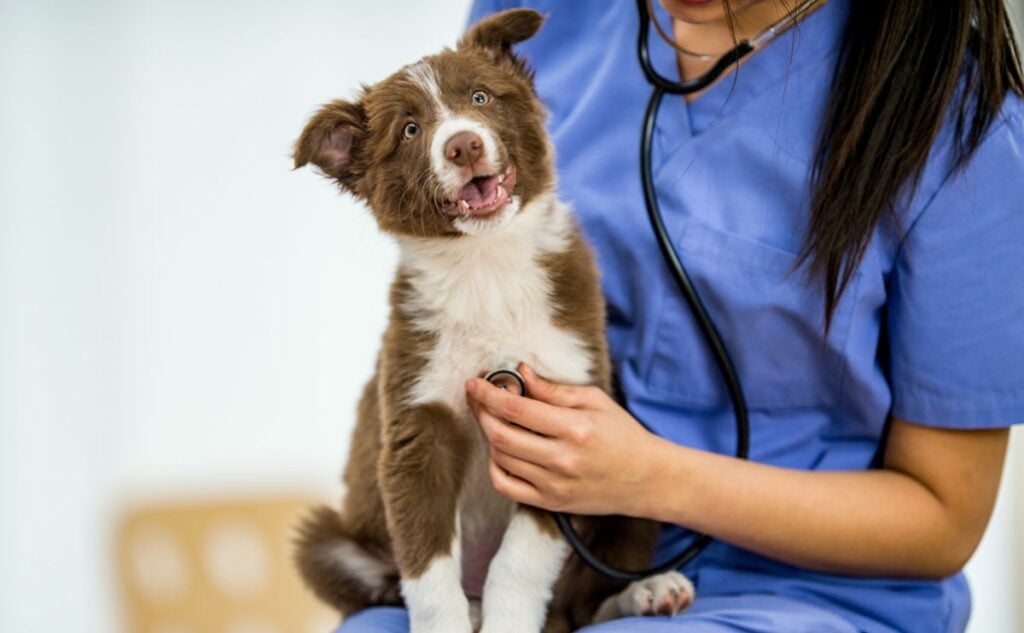
When It’s Time to Call the Vet—Red Flags You Can’t Ignore
Hopefully, your puppy will enjoy a happy and healthy life, and your veterinary visits will be for routine health checks and vaccinations only. However, there are some occasions when a veterinary visit is essential:
- Diarrhea and vomiting – Unfortunately, puppies and adult dogs do suffer from attacks of vomiting and diarrhea from time to time, especially if they’ve eaten something they shouldn’t have. However, if diarrhea and/or vomiting don’t clear up by themselves after a few hours, you should call your vet. There are a few causes of potentially serious gastric problems, including gastroenteritis, poisoning, and ingestion of a foreign object.
- Poor appetite – Most dogs are food lovers. So, if your puppy loses his appetite, you should be concerned, and a call to your vet is in order, especially if your furry friend seems depressed and lethargic too.
- Drinking to excess – Your dog should always have access to clean, fresh water. However, if he begins drinking excessive amounts, that could be an early indicator of a health problem such as diabetes, kidney disease, or hypothyroidism.
- Irregular urination – If your puppy appears uncomfortable when he pees, asks to go out more frequently than usual, or struggles to pee, he could have a urinary tract infection that will require a course of antibiotics to clear it up.
Yearly Vet Visits: Why They Matter More Than You Think
Even if your dog seems healthy, annual veterinary exams play a vital role in catching potential issues early, often before any outward signs of illness. These visits are about more than just booster shots; they’re a comprehensive check-in on your dog’s overall health and well-being.
Most pet owners schedule yearly check-ups to align with their dog’s booster vaccinations, making it convenient to take care of everything in one visit. But the real value of these appointments goes far beyond the needle.
During a wellness exam, your veterinarian will:
- Assess your dog’s weight and body condition, looking for signs of obesity or sudden weight loss, which can signal underlying issues like thyroid imbalance or digestive problems.
- Listen to the heart and lungs with a stethoscope to check for irregular rhythms, murmurs, or respiratory abnormalities that could indicate early heart disease or infection.
- Inspect the teeth and gums to monitor for dental disease, which affects most adult dogs and can lead to pain, tooth loss, and even systemic infection if left untreated.
- Evaluate joints and mobility, especially in aging dogs, to catch early signs of arthritis or orthopedic concerns.
- Palpate the abdomen and lymph nodes to check for unusual masses, swelling, or signs of discomfort.
- These exams also offer an opportunity to update your dog’s parasite prevention plan, including flea, tick, and heartworm protection, and to discuss deworming schedules, which can vary depending on your pet’s lifestyle and environment.
- If your dog is a senior, your vet may recommend additional screenings such as blood work or urinalysis to monitor kidney function, liver enzymes, glucose levels, and other key markers of internal health.
Preventive care is vital in keeping dogs healthy and catching potential problems early. Research shows that dogs receiving regular check-ups are more likely to stay up-to-date on vaccinations, parasite prevention, and dental care, significantly reducing the risk of serious illness.
Routine wellness visits also allow veterinarians to detect subtle health changes before they become major concerns, potentially lowering long-term treatment costs. Prioritizing preventive care helps dogs live healthier lives while giving pet owners peace of mind.
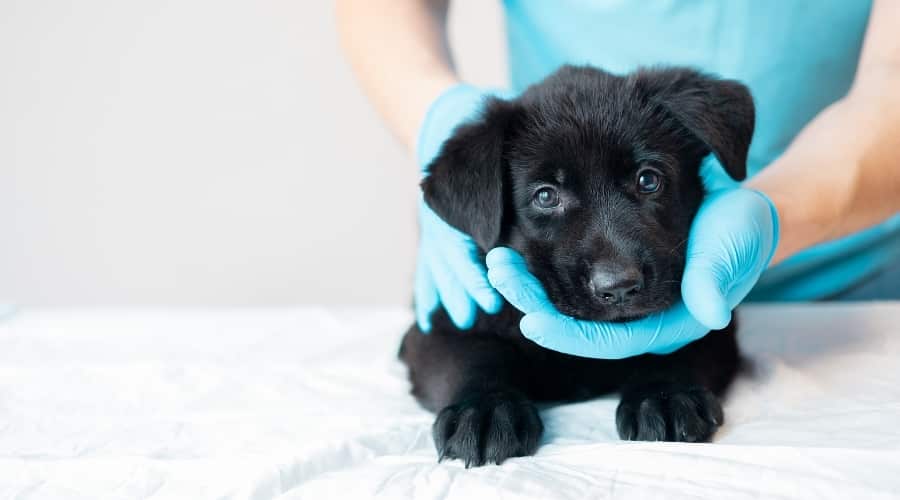
Stress-Free Vet Visits: Tips to Calm Even the Most Anxious Pup
Veterinary visits are essential to keeping your dog healthy, but a trip to the clinic can feel overwhelming for many pets (and their owners). The good news is that with a little preparation and the right approach, vet visits can become calm, positive experiences, even for nervous pups.
Here are some thoughtful, vet-approved strategies to help make every visit as stress-free as possible:
Start Socialization Early
One of the best ways to prevent fear at the vet is to build positive associations from the beginning. Many veterinary clinics offer puppy socialization classes right on-site. These sessions introduce your puppy to the clinic’s sights, sounds, and smells in a fun, relaxed setting, with playtime, praise, and plenty of treats. Puppies that grow up seeing the clinic as a place where good things happen are much less likely to become anxious patients later.
Stop By Just to Say Hello
You don’t need a reason to visit the clinic; sometimes, a quick hello is enough. Call ahead and ask if you can bring your puppy in for a brief social visit. Your pup can meet the nurses, probably have a treat, and head back home with no stressful exams or shots. These low-pressure visits help your puppy learn that the vet clinic doesn’t always mean poking, prodding, or needles.
This type of “fear-free” exposure builds familiarity and reduces stress over time, especially when paired with positive reinforcement at home.
Practice Car Rides Early and Often
Getting to the clinic comfortably is half the battle. Start by getting your puppy used to short car rides as early as possible. Use a well-ventilated crate or a properly fitted canine seatbelt harness to keep your dog secure. Take short, pleasant drives that end in praise or a walk rather than only associating car rides with vet appointments.
If your puppy gets anxious or carsick, your veterinarian can help. There are safe, vet-prescribed anti-nausea medications that can make travel easier for sensitive pups. In many cases, motion sickness improves with time as your puppy matures and becomes more accustomed to the feeling of travel.
Practice Handling at Home
Vet exams often involve checking ears, lifting paws, touching the mouth, and feeling along the belly. These are all normal parts of a physical exam, but they can feel invasive if your dog hasn’t been gently exposed to them before.
Spend a few minutes each day handling your puppy gently at home. Touch their ears, hold their paws, lift their lip to peek at their teeth, and reward them with praise or treats afterward. This builds trust and helps your dog stay calm during the real exam, especially when handled by someone new.
Bring the Right Supplies to the Appointment
Planning makes a big difference. Bring:
- A favorite toy or blanket for comfort
- High-value treats to reward calm behavior
- A secure leash or carrier, especially for nervous dogs
- A copy of any recent records, especially if you’re visiting a new clinic
Staying calm also helps. Dogs are incredibly tuned in to human emotions. If you’re relaxed and positive, your dog is more likely to feel safe.
A little preparation goes a long way when it comes to veterinary visits. With time, consistency, and support from your vet team, even the most anxious pup can learn that going to the clinic isn’t scary. It’s just another part of the routine and maybe even a good excuse to score some extra treats and attention.
Do you have any tips on how to make your puppy’s first vet visit a good experience? We’d love to hear them in the comments and on our forums.
Your Puppy’s Health Journey Starts Here
Before you commit to a dog, ask yourself honestly: Do I have the time, patience, and resources to give this animal a safe, loving, lifelong home? This journey isn’t just about avoiding illness but also about building confidence, connection, and trust. You’re giving your puppy the best start by staying informed and proactive. Keep learning, stay curious, and enjoy every moment. A healthy, joyful life with your dog begins right here.
Once your puppy is settled and growing, yearly vet visits become essential to ongoing care. These wellness exams allow your vet to track development, catch issues early, and keep preventive treatments current. And remember, if you’re ever unsure or concerned, your vet is there to help. No question is too small, especially when you’re just starting out. With good food, consistent care, and a strong relationship with your vet, you’re giving your puppy the foundation for a lifetime of health and happiness.


